Complex Mental Health and Recovery Report - University Assignment
VerifiedAdded on 2022/11/26
|5
|1026
|158
Report
AI Summary
This report addresses the complex relationship between digital technology and mental health, focusing on adolescents. It explores the impact of social media use, including potential links to depression and sleep disturbances, and the role of cyberbullying in exacerbating mental health issues. The report investigates the need for digital education to mitigate negative effects and examines how digital technology influences children's well-being. It also discusses the relevance of social media in promoting mental health, highlighting both the advantages and challenges of using social networking sites for information and support. The report references several studies and literature to support its findings, offering a comprehensive overview of the topic within the context of mental health nursing.
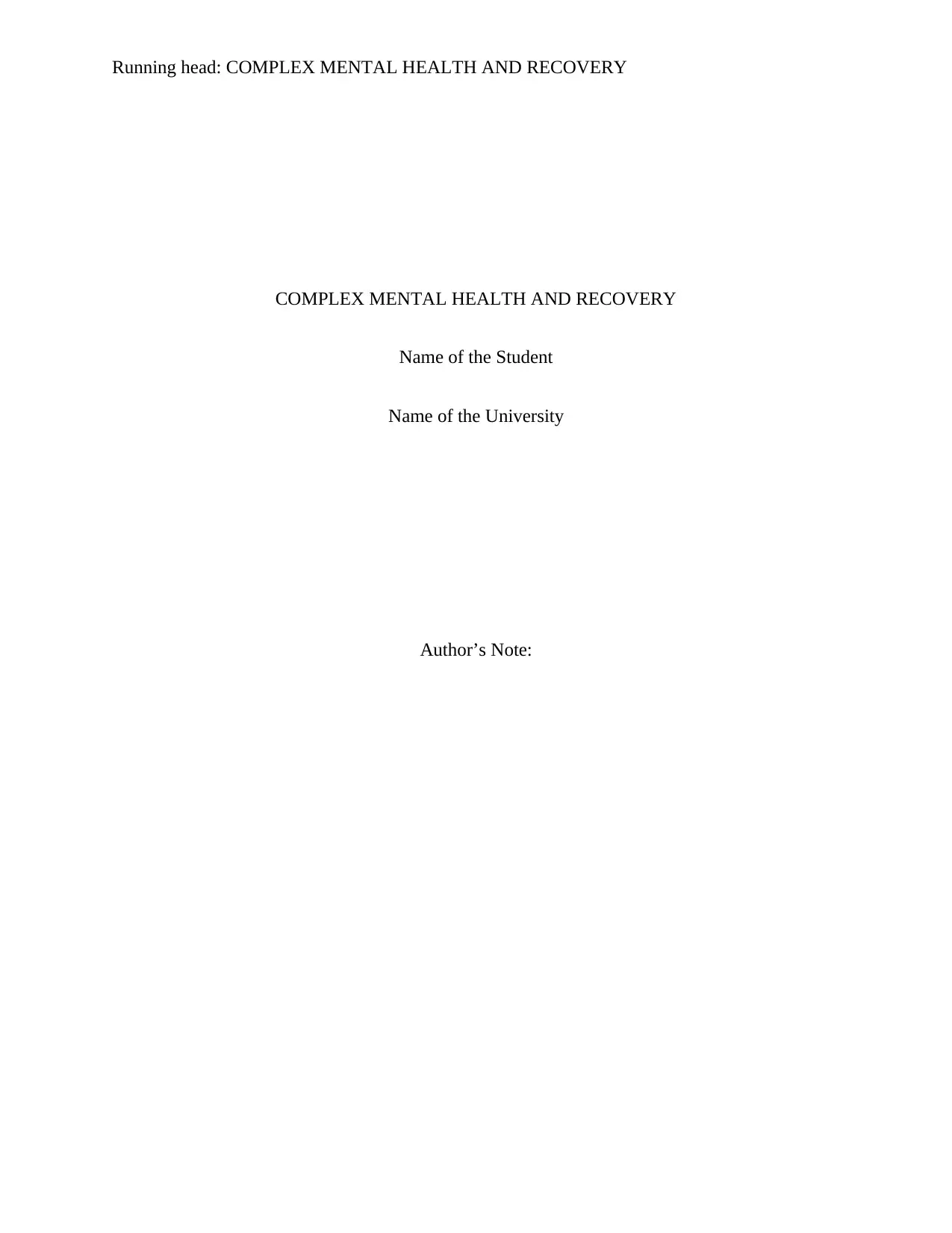
Running head: COMPLEX MENTAL HEALTH AND RECOVERY
COMPLEX MENTAL HEALTH AND RECOVERY
Name of the Student
Name of the University
Author’s Note:
COMPLEX MENTAL HEALTH AND RECOVERY
Name of the Student
Name of the University
Author’s Note:
Paraphrase This Document
Need a fresh take? Get an instant paraphrase of this document with our AI Paraphraser
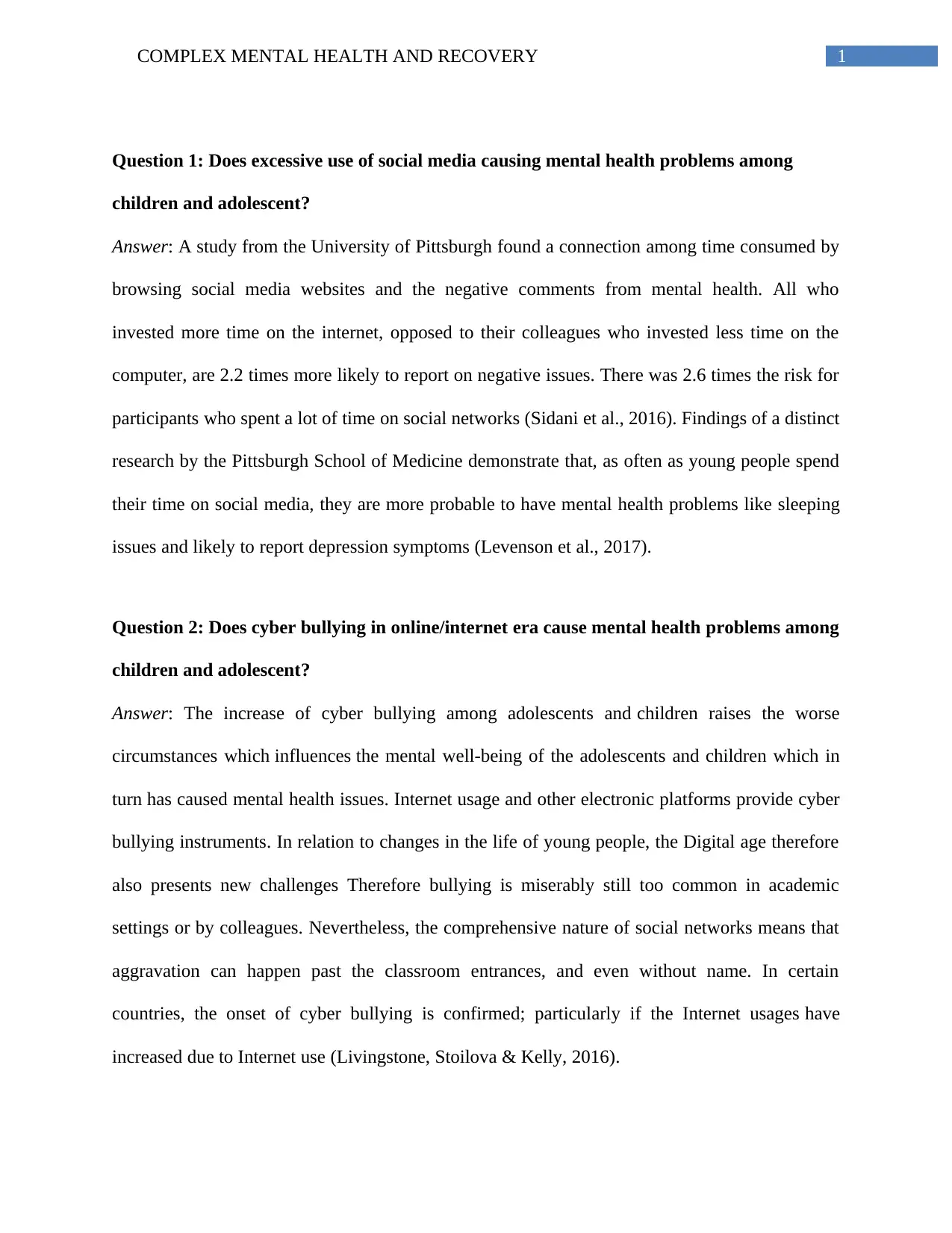
1COMPLEX MENTAL HEALTH AND RECOVERY
Question 1: Does excessive use of social media causing mental health problems among
children and adolescent?
Answer: A study from the University of Pittsburgh found a connection among time consumed by
browsing social media websites and the negative comments from mental health. All who
invested more time on the internet, opposed to their colleagues who invested less time on the
computer, are 2.2 times more likely to report on negative issues. There was 2.6 times the risk for
participants who spent a lot of time on social networks (Sidani et al., 2016). Findings of a distinct
research by the Pittsburgh School of Medicine demonstrate that, as often as young people spend
their time on social media, they are more probable to have mental health problems like sleeping
issues and likely to report depression symptoms (Levenson et al., 2017).
Question 2: Does cyber bullying in online/internet era cause mental health problems among
children and adolescent?
Answer: The increase of cyber bullying among adolescents and children raises the worse
circumstances which influences the mental well-being of the adolescents and children which in
turn has caused mental health issues. Internet usage and other electronic platforms provide cyber
bullying instruments. In relation to changes in the life of young people, the Digital age therefore
also presents new challenges Therefore bullying is miserably still too common in academic
settings or by colleagues. Nevertheless, the comprehensive nature of social networks means that
aggravation can happen past the classroom entrances, and even without name. In certain
countries, the onset of cyber bullying is confirmed; particularly if the Internet usages have
increased due to Internet use (Livingstone, Stoilova & Kelly, 2016).
Question 1: Does excessive use of social media causing mental health problems among
children and adolescent?
Answer: A study from the University of Pittsburgh found a connection among time consumed by
browsing social media websites and the negative comments from mental health. All who
invested more time on the internet, opposed to their colleagues who invested less time on the
computer, are 2.2 times more likely to report on negative issues. There was 2.6 times the risk for
participants who spent a lot of time on social networks (Sidani et al., 2016). Findings of a distinct
research by the Pittsburgh School of Medicine demonstrate that, as often as young people spend
their time on social media, they are more probable to have mental health problems like sleeping
issues and likely to report depression symptoms (Levenson et al., 2017).
Question 2: Does cyber bullying in online/internet era cause mental health problems among
children and adolescent?
Answer: The increase of cyber bullying among adolescents and children raises the worse
circumstances which influences the mental well-being of the adolescents and children which in
turn has caused mental health issues. Internet usage and other electronic platforms provide cyber
bullying instruments. In relation to changes in the life of young people, the Digital age therefore
also presents new challenges Therefore bullying is miserably still too common in academic
settings or by colleagues. Nevertheless, the comprehensive nature of social networks means that
aggravation can happen past the classroom entrances, and even without name. In certain
countries, the onset of cyber bullying is confirmed; particularly if the Internet usages have
increased due to Internet use (Livingstone, Stoilova & Kelly, 2016).
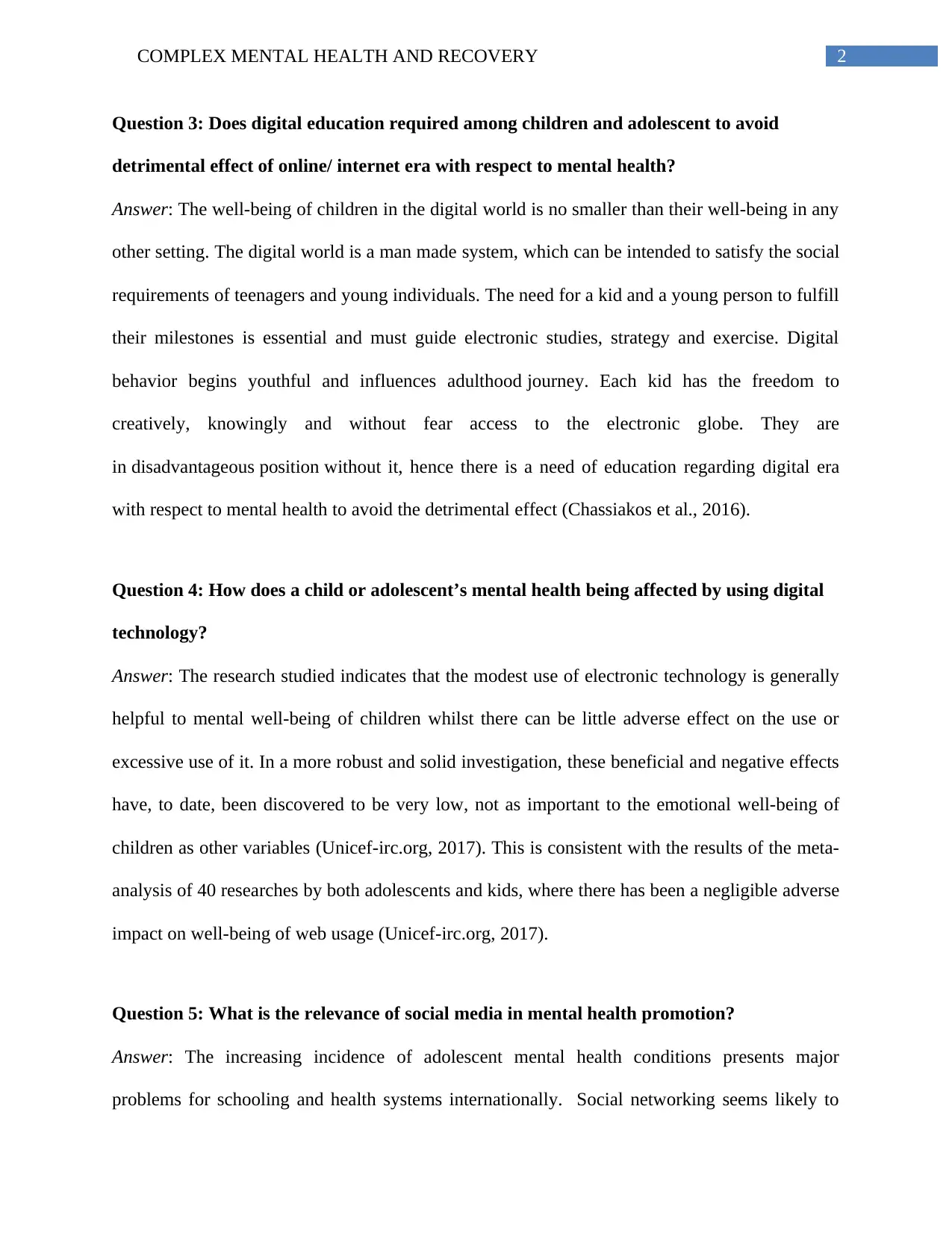
2COMPLEX MENTAL HEALTH AND RECOVERY
Question 3: Does digital education required among children and adolescent to avoid
detrimental effect of online/ internet era with respect to mental health?
Answer: The well-being of children in the digital world is no smaller than their well-being in any
other setting. The digital world is a man made system, which can be intended to satisfy the social
requirements of teenagers and young individuals. The need for a kid and a young person to fulfill
their milestones is essential and must guide electronic studies, strategy and exercise. Digital
behavior begins youthful and influences adulthood journey. Each kid has the freedom to
creatively, knowingly and without fear access to the electronic globe. They are
in disadvantageous position without it, hence there is a need of education regarding digital era
with respect to mental health to avoid the detrimental effect (Chassiakos et al., 2016).
Question 4: How does a child or adolescent’s mental health being affected by using digital
technology?
Answer: The research studied indicates that the modest use of electronic technology is generally
helpful to mental well-being of children whilst there can be little adverse effect on the use or
excessive use of it. In a more robust and solid investigation, these beneficial and negative effects
have, to date, been discovered to be very low, not as important to the emotional well-being of
children as other variables (Unicef-irc.org, 2017). This is consistent with the results of the meta-
analysis of 40 researches by both adolescents and kids, where there has been a negligible adverse
impact on well-being of web usage (Unicef-irc.org, 2017).
Question 5: What is the relevance of social media in mental health promotion?
Answer: The increasing incidence of adolescent mental health conditions presents major
problems for schooling and health systems internationally. Social networking seems likely to
Question 3: Does digital education required among children and adolescent to avoid
detrimental effect of online/ internet era with respect to mental health?
Answer: The well-being of children in the digital world is no smaller than their well-being in any
other setting. The digital world is a man made system, which can be intended to satisfy the social
requirements of teenagers and young individuals. The need for a kid and a young person to fulfill
their milestones is essential and must guide electronic studies, strategy and exercise. Digital
behavior begins youthful and influences adulthood journey. Each kid has the freedom to
creatively, knowingly and without fear access to the electronic globe. They are
in disadvantageous position without it, hence there is a need of education regarding digital era
with respect to mental health to avoid the detrimental effect (Chassiakos et al., 2016).
Question 4: How does a child or adolescent’s mental health being affected by using digital
technology?
Answer: The research studied indicates that the modest use of electronic technology is generally
helpful to mental well-being of children whilst there can be little adverse effect on the use or
excessive use of it. In a more robust and solid investigation, these beneficial and negative effects
have, to date, been discovered to be very low, not as important to the emotional well-being of
children as other variables (Unicef-irc.org, 2017). This is consistent with the results of the meta-
analysis of 40 researches by both adolescents and kids, where there has been a negligible adverse
impact on well-being of web usage (Unicef-irc.org, 2017).
Question 5: What is the relevance of social media in mental health promotion?
Answer: The increasing incidence of adolescent mental health conditions presents major
problems for schooling and health systems internationally. Social networking seems likely to
⊘ This is a preview!⊘
Do you want full access?
Subscribe today to unlock all pages.

Trusted by 1+ million students worldwide
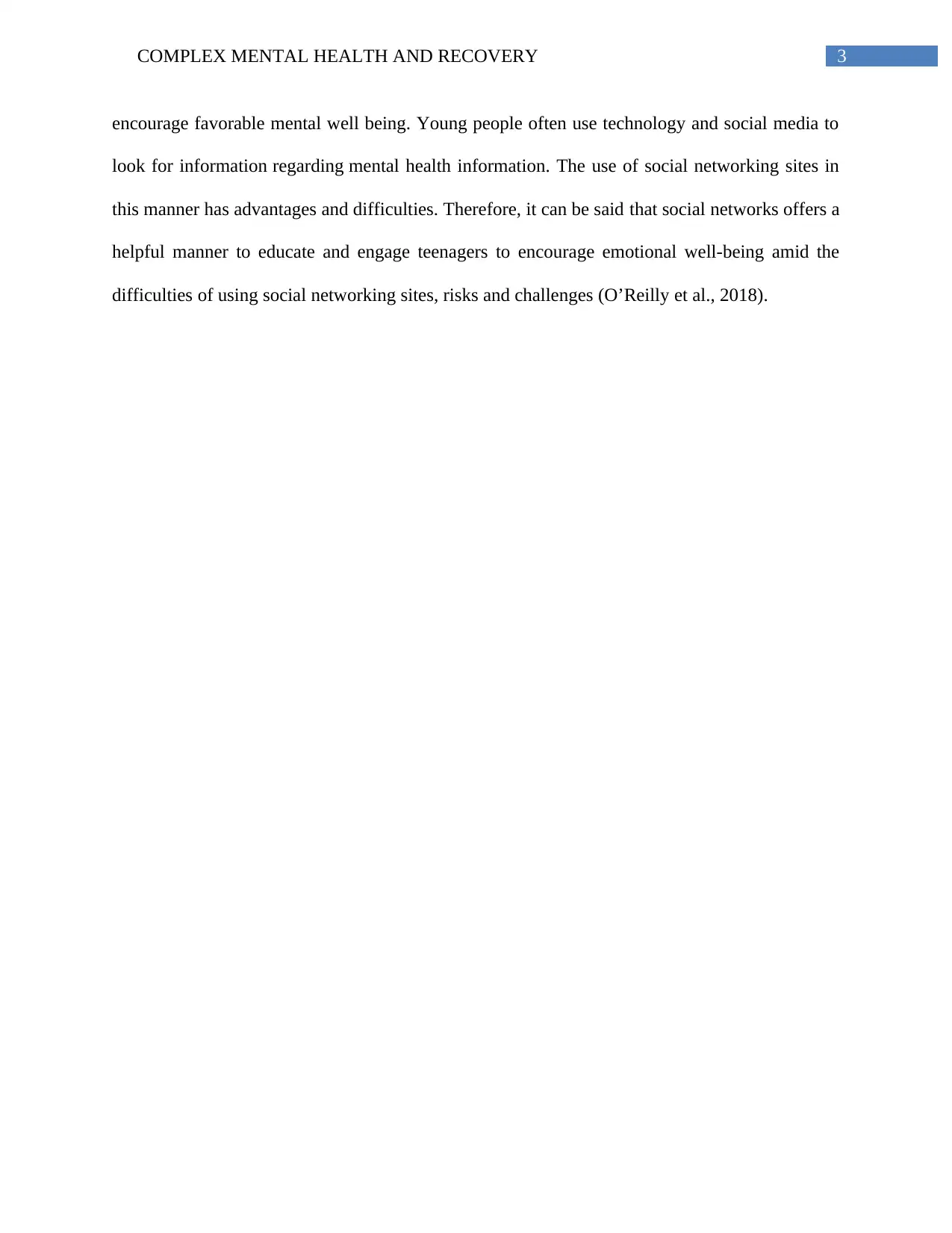
3COMPLEX MENTAL HEALTH AND RECOVERY
encourage favorable mental well being. Young people often use technology and social media to
look for information regarding mental health information. The use of social networking sites in
this manner has advantages and difficulties. Therefore, it can be said that social networks offers a
helpful manner to educate and engage teenagers to encourage emotional well-being amid the
difficulties of using social networking sites, risks and challenges (O’Reilly et al., 2018).
encourage favorable mental well being. Young people often use technology and social media to
look for information regarding mental health information. The use of social networking sites in
this manner has advantages and difficulties. Therefore, it can be said that social networks offers a
helpful manner to educate and engage teenagers to encourage emotional well-being amid the
difficulties of using social networking sites, risks and challenges (O’Reilly et al., 2018).
Paraphrase This Document
Need a fresh take? Get an instant paraphrase of this document with our AI Paraphraser
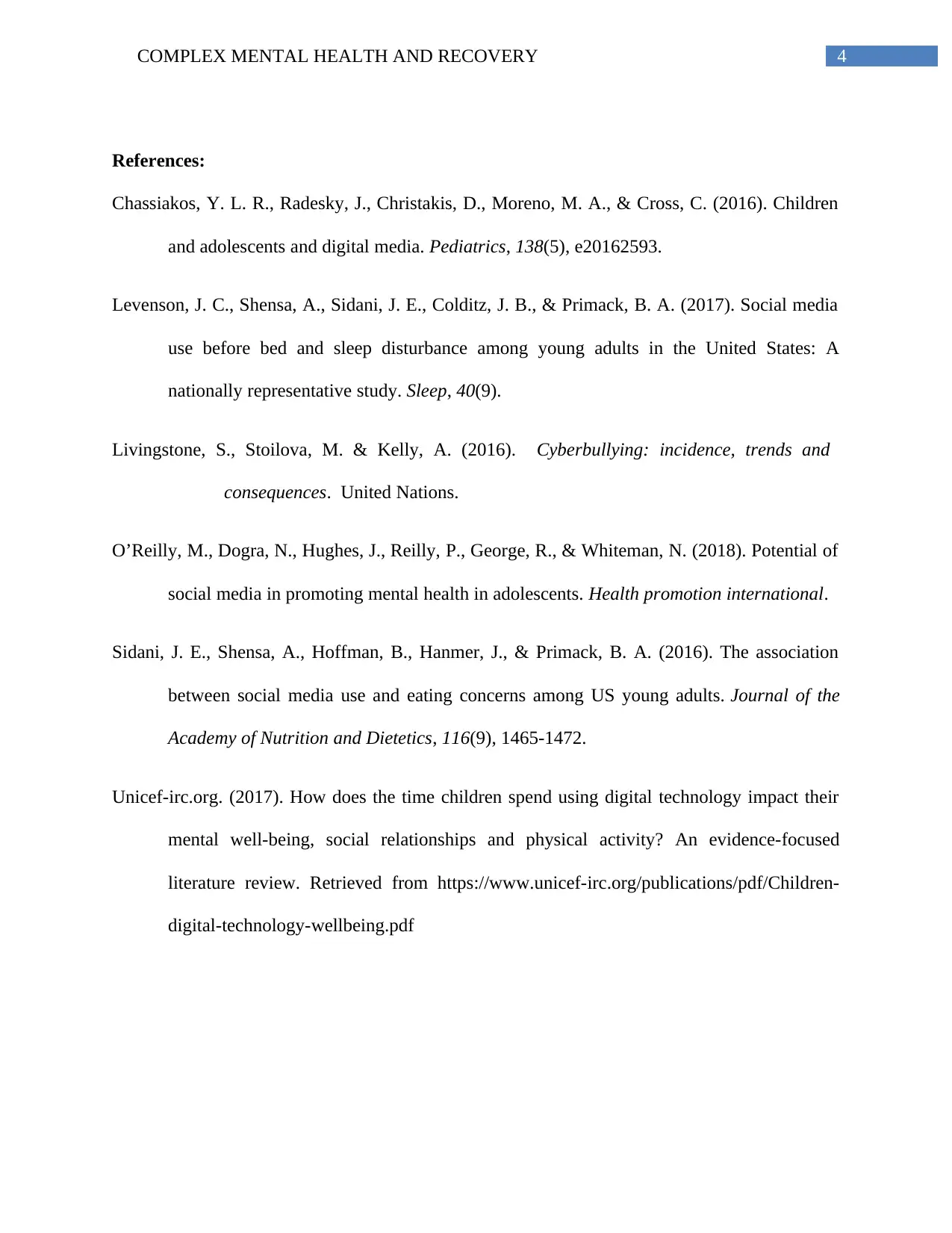
4COMPLEX MENTAL HEALTH AND RECOVERY
References:
Chassiakos, Y. L. R., Radesky, J., Christakis, D., Moreno, M. A., & Cross, C. (2016). Children
and adolescents and digital media. Pediatrics, 138(5), e20162593.
Levenson, J. C., Shensa, A., Sidani, J. E., Colditz, J. B., & Primack, B. A. (2017). Social media
use before bed and sleep disturbance among young adults in the United States: A
nationally representative study. Sleep, 40(9).
Livingstone, S., Stoilova, M. & Kelly, A. (2016). Cyberbullying: incidence, trends and
consequences. United Nations.
O’Reilly, M., Dogra, N., Hughes, J., Reilly, P., George, R., & Whiteman, N. (2018). Potential of
social media in promoting mental health in adolescents. Health promotion international.
Sidani, J. E., Shensa, A., Hoffman, B., Hanmer, J., & Primack, B. A. (2016). The association
between social media use and eating concerns among US young adults. Journal of the
Academy of Nutrition and Dietetics, 116(9), 1465-1472.
Unicef-irc.org. (2017). How does the time children spend using digital technology impact their
mental well-being, social relationships and physical activity? An evidence-focused
literature review. Retrieved from https://www.unicef-irc.org/publications/pdf/Children-
digital-technology-wellbeing.pdf
References:
Chassiakos, Y. L. R., Radesky, J., Christakis, D., Moreno, M. A., & Cross, C. (2016). Children
and adolescents and digital media. Pediatrics, 138(5), e20162593.
Levenson, J. C., Shensa, A., Sidani, J. E., Colditz, J. B., & Primack, B. A. (2017). Social media
use before bed and sleep disturbance among young adults in the United States: A
nationally representative study. Sleep, 40(9).
Livingstone, S., Stoilova, M. & Kelly, A. (2016). Cyberbullying: incidence, trends and
consequences. United Nations.
O’Reilly, M., Dogra, N., Hughes, J., Reilly, P., George, R., & Whiteman, N. (2018). Potential of
social media in promoting mental health in adolescents. Health promotion international.
Sidani, J. E., Shensa, A., Hoffman, B., Hanmer, J., & Primack, B. A. (2016). The association
between social media use and eating concerns among US young adults. Journal of the
Academy of Nutrition and Dietetics, 116(9), 1465-1472.
Unicef-irc.org. (2017). How does the time children spend using digital technology impact their
mental well-being, social relationships and physical activity? An evidence-focused
literature review. Retrieved from https://www.unicef-irc.org/publications/pdf/Children-
digital-technology-wellbeing.pdf
1 out of 5
Related Documents
Your All-in-One AI-Powered Toolkit for Academic Success.
+13062052269
info@desklib.com
Available 24*7 on WhatsApp / Email
![[object Object]](/_next/static/media/star-bottom.7253800d.svg)
Unlock your academic potential
Copyright © 2020–2026 A2Z Services. All Rights Reserved. Developed and managed by ZUCOL.





